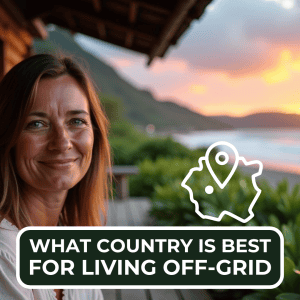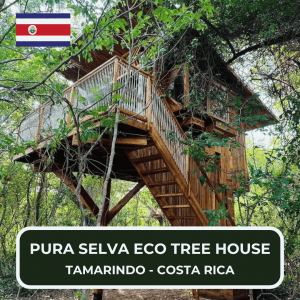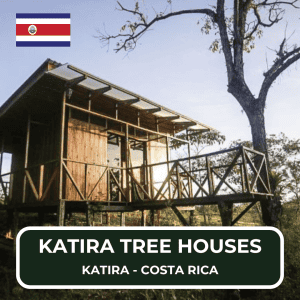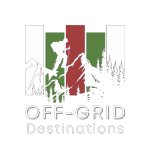Many people dream of leaving the busy world behind to live off-grid. With living costs soaring, finding peace and self-sufficiency has become a goal for many. About 250,000 Americans have already chosen this path, discovering freedom away from city life.
Matt and Amy of OffGridDestinations.com know this journey well. They’ve turned their love for adventure into a lifestyle, creating an oasis in the Costa Rican jungle.
Their expertise shines through in solar power and eco-friendly practices. This blog explores top places in the USA and beyond to establish your off-grid haven – from Texas’s vast lands to Iowa’s welcoming communities and even remote islands rich in nature’s bounty.
Whether you’re seeking lush landscapes or a supportive off-grid community, we pinpoint where you can thrive independently. Ready to find your perfect spot?
Table of Contents
ToggleKey Factors for Choosing an Off-Grid Location
Choosing the right spot for off-grid living depends on many things. Matt and Amy from OffGridDestinations.com say to think about the weather, water access, laws in the area, and taxes on property.
Local Climate
Local climate is key in off-grid living. It affects farming and raising animals. Places with mild weather let you grow food all year. But, areas prone to natural disasters can make living hard.
So, checking local weather and disaster risks is a must before choosing a place to go off the grid. This ensures your farm thrives and your home stays safe from floods or storms.
Accessibility of Water
Getting water is key for living off the grid. You can get it from private wells, trucked in, or by catching rain. Yet, Colorado and Utah have rules against catching rainwater. This means you need to check the laws if you plan to collect rainwater in these states.
Always make sure to understand the water rights and options available in your chosen location for an off-grid homestead.
Local Zoning Laws
Local zoning laws can control if you can build off-grid homes in some places. For example, they decide if land is for houses or farms. Some areas might let you change the zone to grow food or live without the usual power grid.
However, some counties in Texas make it easy because they do not have strict building codes. This means people looking for off-grid living find fewer rules there. Always check these laws before buying land for your new home away from cities.
Property Tax Considerations
Property taxes can make a big difference when living off-grid. In states like Missouri and Texas, property taxes are lower in rural areas. This helps save money for those choosing to live away from the grid.
Also, land used for farming often has tax benefits but needs more investment upfront. People looking at off-grid spots need to think about these taxes as they plan their new lifestyle.
It’s a key part of getting ready to move away from city life and into the wild or quieter places where they can be closer to nature.
Best States to live off the grid in the USA
The best states for off-grid living in the USA offer vast land, renewable energy options, and low taxes; explore which states lead for a simpler life.
Texas: Vast lands with renewable energy potential
Texas offers a lot of land perfect for living off-grid. This state became more famous for its solar energy than coal in March 2024. With a score of 65.58, it’s second-best for an off-grid lifestyle.
People choose Texas because they can use solar panels or wind turbines to make their own electricity. Its large open spaces let you live freely, away from busy city life. You’ll find cheaper land here, making it easier to start your off-grid dream.
Living completely off the grid in Texas is possible due to its vast lands with renewable energy potential. Solar power beats coal generation here, showing how good the sun is for your energy needs.
Hunters and fishermen also love Texas for its wildlife and fish-rich waters. Its landscape allows you to grow food and raise animals well. Plus, low living costs help you save money while enjoying nature.
Wyoming: Low population density and favorable tax laws
Wyoming stands out for off-grid living with its low population and big open spaces. It offers plenty of room for those looking to live far from crowds. The state has laws that favor people who want to live off the grid, making it easier and cheaper.
Wyoming: Where solitude meets freedom.
Tax laws in Wyoming are friendly for land owners. People pay less tax here compared to many other states. This means you can save money while enjoying nature’s beauty and peace.
Montana: Rich in natural resources and scenic beauty
Montana is 10th in the best states to live off-grid. It has lots of natural beauty and resources. People here enjoy a simple life close to nature. They have fun outdoors, like hiking and fishing.
This state is great for living away from busy places. You can be self-sufficient here, thanks to the land and water around you. Montana offers a good mix of low cost of living and beautiful landscapes for those who want to live differently.
Iowa: Affordable land and supportive community structures
Iowa stands out for people wanting to live off-grid. It offers land at low costs. The score of 67.12 makes Iowa the top state for this lifestyle. With a safety rank of 1, it is very safe.
Phone coverage has gotten much better too.
In Iowa, communities support off-grid living well. This makes finding help and advice easy for newcomers. People considering moving away from cities find Iowa perfect for a quieter life close to nature.
Missouri: Water availability and fertile agricultural land
Missouri stands out for off-grid living because of its water and land. Streams and rivers flow across the state, giving plenty of water for houses not linked to a city’s system. This water can be used for drinking, cooking, and farming.
Missouri also has fertile soil that helps crops grow well. Farmers in Missouri raise many kinds of food.
Missouri’s natural resources make it one of the top 10 states for living off the grid.
International Destinations for Off-Grid Living
4. International Destinations for Off-Grid Living: For those dreaming of living off-grid beyond the U.S., places like Lord Howe Island, Tristan Da Cunha, Lasqueti Island, and Fernando De Noronha offer unique opportunities for sustainable living.
Explore these global spots for a true adventure into self-sufficiency.
Lord Howe Island, Australia: Isolated and sustainable
Lord Howe Island in Australia limits visitors to 400 at any time. This helps protect its environment. The island has over 85% native forest, and 70% is a Permanent Park Preserve. This makes it a great place to live off-grid.
The community values sustainability and nature. With strict visitor caps, Lord Howe offers a unique chance for people to enjoy an eco-friendly lifestyle away from busy places.
Tristan Da Cunha, UK: The most remote inhabited archipelago
Tristan Da Cunha sits 1,732 miles away from Cape Town, South Africa. It holds the title for the most remote inhabited archipelago in the world. Only about 250 people call this island home.
They live far from busy cities and crowded places.
Tristan Da Cunha offers a unique off-grid living experience unlike any other.
Living here means being part of a small community with vast oceans as your nearest neighbors. This location truly defines remote area living, making it an ideal spot for those wanting to go off grid and live without the usual crowd or noise found elsewhere.
Lasqueti Island, British Columbia, Canada: Community-driven sustainability
Lasqueti Island in British Columbia, Canada, is a unique place. Around 400 people live there off the grid. They do not use BC Hydro’s power system. Instead, many have solar panels for electricity.
This island shows how to live in a green and community-driven way.
People on Lasqueti Island work together to keep their land clean and safe. They show that living without the usual power can work well. This island is a great example for travelers looking for off-grid places to visit or live.
Fernando De Noronha, Brazil: Rich in biodiversity and renewable energy
Fernando De Noronha, Brazil, stands out for its rich biodiversity. The island is a UNESCO World Heritage site and a maritime national park. This place offers great snorkeling spots because of its diverse marine life.
The island also focuses on renewable energy to keep its natural beauty safe. Visitors love the clean beaches and clear waters. Fernando De Noronha shows how places can stay beautiful while using green energy sources.
Considerations to live off-grid
For Off-Grid Living, understanding local building codes and renewable energy laws is crucial. You also need to know about nearby food sources and how to prepare for emergencies.
Building and Renewable Energy Codes
Building and renewable energy codes play a big part in off-grid living. These rules decide how homes use solar panels, wind turbines, and other green energy sources. For example, Jordan started setting up solar PV systems in 2012.
By 2022, about 29% of its electricity came from renewable sources. This shows a growing focus on using clean energy worldwide.
People looking for the best places to live off-grid need to check local building laws first. Some areas have strict rules that might limit what you can build or how you can collect rainwater or make your own power.
Knowing these codes helps avoid trouble and makes sure your off-grid home meets all legal needs.
Local Food Sources and Agriculture
Local food sources and agriculture play a big part in off-grid living. Growing your own food cuts down on trips to the grocery store. It also makes you more self-sufficient. Sustainable agriculture is key here.
It helps produce enough food for everyone while taking care of our planet.
Farming activities add up to 24% of the world’s greenhouse gas emissions. So, choosing eco-friendly farming methods can lower pollution. Examples include using solar panels and collecting rainwater for crops.
These steps help live off-grid more easily and are better for the earth.
Emergency Preparedness and Self-Sufficiency
To live off-grid, one must know how to handle no electric grid. Skills in solar power upkeep are key. People should also learn to store food long-term. Valley Food Storage can help with this.
They sell food that lasts 25 years. Knowing first aid is another must for health emergencies.
Having a good water supply matters too. For drinking and crops, rainwater harvesting sets up a steady source. Growing your own food adds to self-sufficiency. With these steps, living far from the madding crowd becomes safer and more doable.
Conclusion
Choosing the right spot to live off-grid depends on a few key things. People need to think about the local weather, if they can get water easily, and what the laws are like. States like Texas, Wyoming, Montana, Iowa, and Missouri offer good options because of their land, laws, and resources.
Across the world, places like Lord Howe Island in Australia and Tristan Da Cunha in the UK are great for those wanting more adventure in nature. For successful living away from city services, it’s critical to know how to generate power on your own using solar panels or wind turbines.
Also important is being ready for emergencies with food storage and having skills like gardening and handling water systems. Joining communities that share this lifestyle helps too by offering advice and support.
FAQs
1. What does it mean to live off-the-grid?
Living off-the-grid refers to a lifestyle where people are self-sufficient, disconnected from the main electrical grid, and often rely on their land for food and energy development.
2. Where is the best state for off-grid living in the United States?
The best state for off-grid living varies based on personal needs but some of the top states include Oregon, Nevada, Tennessee, Alabama, Arizona and Alaska due to their livability factors such as climate, growing season length and access to resources like water systems or firewood.
3. How do I find an ideal location for off-grid living?
To find an ideal location one should consider factors such as rainfall rates for crops; availability of hunting and fishing opportunities; laws related to riparian water rights; cost of real estate including lots of off grid land; potential income sources if needed; budgeting considerations including backup solutions like electric generators or photovoltaics.
4. Can you live completely isolated while being off-the-grid?
While many choose this lifestyle with desire of isolation in mind, complete seclusion may impact your ability to trade goods or services which could be essential during times when self-sustainability is challenged by unforeseen circumstances such as extreme weather conditions.
5. Is it possible to build infrastructure while living off-the-grid?
Yes! Despite being detached from public utilities there are alternatives available: solar panels (photovoltaics), wind turbines (micro hydro) can generate electricity while compost toilets serve as septic system replacements plus root cellars can store grown food during winter months.
6. Are there any challenges associated with going completely off-the-grid?
Indeed! Challenges include construction costs of required infrastructure like housing or power generation devices along with maintaining self-sustainability through livestock rearing or crop cultivation which requires knowledge about local growing seasons plus efficient heat management techniques especially in colder climates.















